【成才之路】2014-2015学年高中英语必修四(外研版)强化练习:Module 4 第1课时]
- 格式:doc
- 大小:443.00 KB
- 文档页数:8
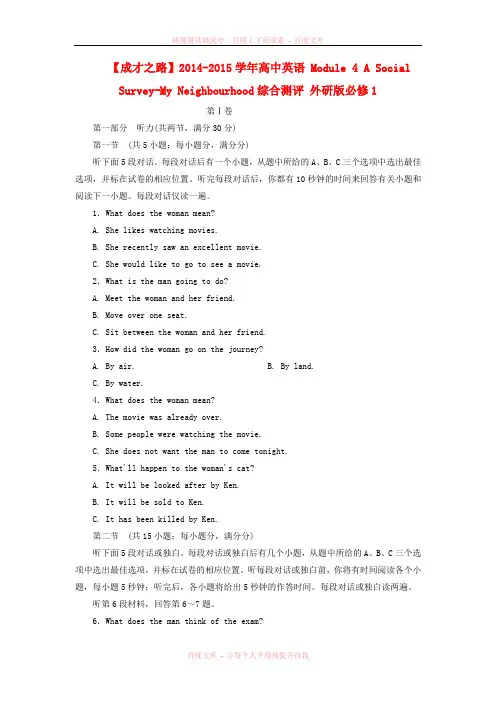
【成才之路】2014-2015学年高中英语 Module 4 A SocialSurvey-My Neighbourhood综合测评外研版必修1第Ⅰ卷第一部分听力(共两节,满分30分)第一节(共5小题;每小题分,满分分)听下面5段对话。
每段对话后有一个小题,从题中所给的A、B、C三个选项中选出最佳选项,并标在试卷的相应位置。
听完每段对话后,你都有10秒钟的时间来回答有关小题和阅读下一小题。
每段对话仅读一遍。
1.What does the woman mean?A. She likes watching movies.B. She recently saw an excellent movie.C. She would like to go to see a movie.2.What is the man going to do?A. Meet the woman and her friend.B. Move over one seat.C. Sit between the woman and her friend.3.How did the woman go on the journey?A. By air.B. By land.C. By water.4.What does the woman mean?A. The movie was already over.B. Some people were watching the movie.C. She does not want the man to come tonight.5.What'll happen to the woman's cat?A. It will be looked after by Ken.B. It will be sold to Ken.C. It has been killed by Ken.第二节(共15小题;每小题分,满分分)听下面5段对话或独白。
![【成才之路】2014-2015学年高中英语必修四(外研版)强化练习:Module 5 第1课时]](https://uimg.taocdn.com/7d4dcc5d2b160b4e767fcf26.webp)
Module 5第一课时Ⅰ.根据所给汉语意思或首字母提示拼写单词1.Their food supply decreased when they were lost in the________.(树林)2.Much of the countryside in East England is very________(平坦的).3.Brad sat at his desk, s________by books and papers.4.The wide track________(变狭窄) before crossing another stream.5.In some area, it is now forbidden to e________mineral resources.6.Such trees can be found in the ____________(平原).7.The market for sporting g______________in America is enormous.8.Smoking is not a ______________ in public.9.____________(贸易)between China and Sweden has increased.10.We judged the d ________ to be about 10 miles.答案:1.woods 2.flat 3.surrounded 4.narrows 5.exploit 6.plains7.goods8.allowed 9.Trade10.distanceⅡ.完成句子1.该镇四周围着城墙。
The town ______________________walls.2.今天他像往常一样穿着一套三件套西装。
Today,______________,he is wearing a three-piece suit.3.由于他母亲生病,他请了一周假。
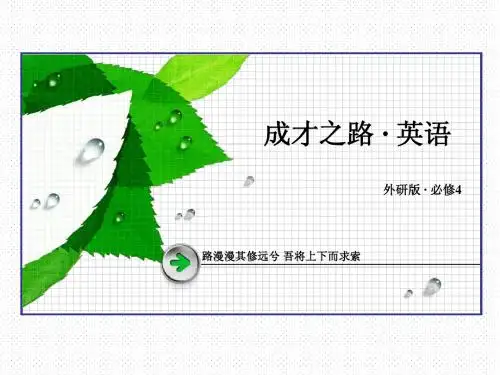
![【成才之路】2014-2015学年高中英语必修四(外研版)强化练习Module 1 第2课时]](https://uimg.taocdn.com/f7127760b307e87101f6965c.webp)
第二课时Module 1用所给动词的适当形式填空.ⅠBy the middle of this century, more people __________________(live) in the city than in the .1 country. (wear) smart clothes. Ten years from now, people ____________________ .2 Humans ____________________(live) on another planet five billion years from now. .3 week. I __________________(take) a test this time next .4 They ____________________(have) a meeting at nine tomorrow morning. .5 I hope he ________________(find)a good job one day. .6 That bus ____________________(leave) in 10 minutes. .7 __________________(do) their homework when we get home. I think the kids .8 5.will be having 4.will be taking 3.will be living 2.will be wearing 1.will be living答案:will be doing .8 7.is leaving 6.will find 完成句子.Ⅱ.下午五点至六点之间不要给我打电话,那时我们在吃饭。
1 00 pm. We ________ ________ ________ dinner :00 pm and 6:Don't phone me between 5 then. .克雷格教授明晚将要做关于伊特洛里亚陶器的演讲。
![【成才之路】2014-2015学年高中英语必修四强化练习Unit2Section3]](https://uimg.taocdn.com/db4c9f2aa58da0116d174956.webp)
Unit 2 Section 3单词拼写 .Ⅰ)experiment. 化学的 We are doing a________________.(1 ) is that I have missed thechance to go 遗憾My only ________________(. 2 abroad for further education. ) me. 使诱惑 They asked so many questions that they ________________.( 3 .)生产 Thousands of men were employed for car ________________.(4 ) for your body. 营养 A balanced diet provides ________________.( 5 ) are being made every day.发现 New scientific ________________.(6 ) of the problem. 根源I finally got to the ________________.( 7 ) that it was an excellent film.评论 He ________________(. 82.regret 1.chemical :案答mented 7.tool 达成句子 .Ⅱ .慢慢地,院子里的地面上积起了一层厚厚的雪。
1Slowly a lot of snow ________________ on the ground'ssurface in the yard. .过度的工作和过少的歇息会惹起疾病。
2 Too much work and too little rest often________________________..汤姆,请集中注意力听老师讲课。
3Tom, please ________________________________listening to the teacher..你们最好让这个地域免受空气污染。
![【成才之路】2014-2015学年高中英语必修四(十二省区)强化练习unit 4 Section 2]](https://uimg.taocdn.com/0a3bae1731126edb6f1a105d.webp)
ⅡSection Unit 4语法单项填空.Ⅰ He sat on a chair under the shade of the tree, ________(read) a novel. .1之间为主动read与he句意:他坐在树荫下的椅子上看小说。
句子的主语 reading答案:关系,故用现在分词作伴随状语。
The boys and girls are walking along the street, each________(wear) a small yellow cap. .2 a wear each they and 相当于分词作伴随状语,意思等同于wearingeach wearing答案:。
small yellow cap When I reached home, my husband was lying on the floor, ________(entertain) the kids with .3 toys. 考查非谓语动词。
句意:当我回到家时,丈夫正躺在地板上,用玩具entertaining答案:是主动关系。
entertain与my husband逗孩子玩呢。
现在分词作状语表伴随。
com. Chinadaily.4 is the largest English site in China, ________(provide) news, business cn. information and learning materials. 考查非谓语动词。
句意:“中国日报网”是中国最大的英语网站,提供 providing答案:新闻、商业信息和学习材料。
China became the 143rd member of the WTO on December 11,2001, thus ________(realize) .5 year wish to join the global trade body. its 15-实现个成员国,143日成为世贸组织的第11月12年2001中国于句意: realizing答案:形式作结果状语。
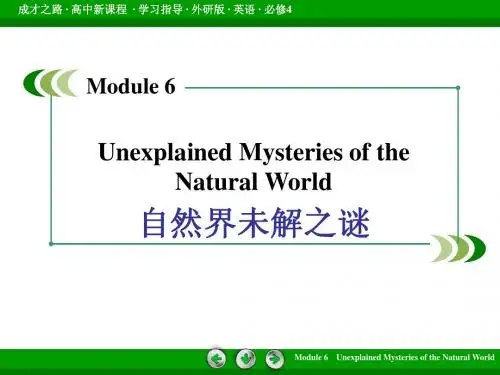
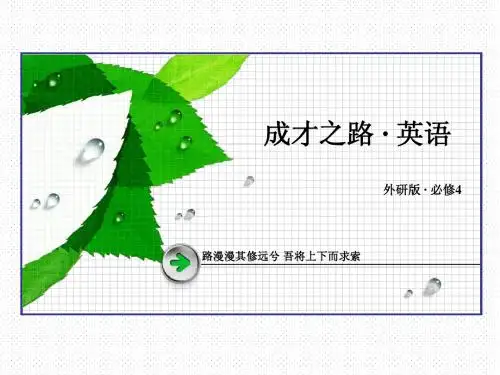
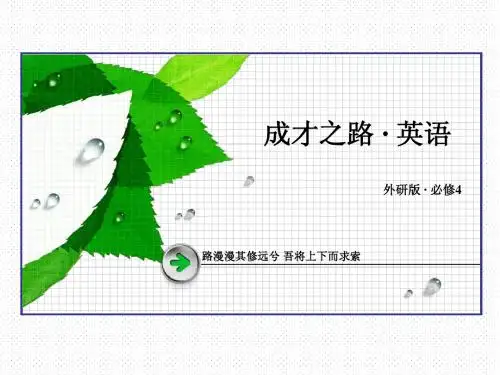
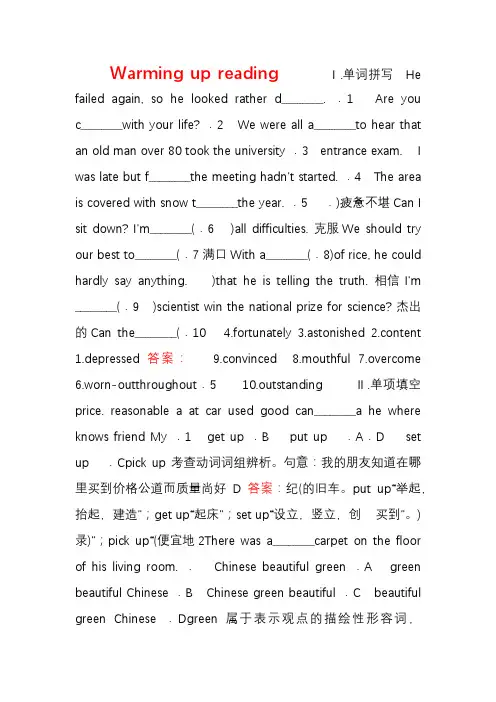
Warming up reading Ⅰ.单词拼写 He failed again, so he looked rather d________. .1 Are you c________with your life? .2 We were all a________to hear that an old man over 80 took the university .3 entrance exam. I was late but f________the meeting hadn't started. .4 The area is covered with snow t________the year. .5 .)疲惫不堪Can I sit down? I'm________(.6 )all difficulties. 克服We should try our best to________(.7满口With a________(.8)of rice, he could hardly say anything. )that he is telling the truth. 相信I'm ________(.9 )scientist win the national prize for science? 杰出的Can the________(.10 4.fortunately 3.astonished 2.content 1.depressed 答案:9.convinced 8.mouthful 7.overcome 6.worn-outthroughout.5 10.outstanding Ⅱ.单项填空 price. reasonable a at car used good can________a he where knows friend My .1 get up .B put up .A.D set up .Cpick up 考查动词词组辨析。
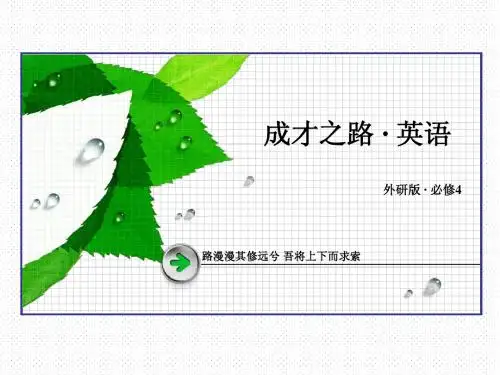
第一课时 Module 4单词拼写.Ⅰ )in the kidney transplantation. 突破Surgeons have made a great________ (.1 )such a large family. 供养He needs a high income to ________(.2 is waste more and more industry, )and 农业(modern________ of development the With .3 produced. )in Indian history. 人物He is an important political________(.4 )is given to children by the government. 教育________(.5 )owner of the house was Duke Wellington. 最初的The________(.6 ) of our product. 质量We are very proud of the high________(.7The scientific study of the chemistry of living things is called________(.8 .)生物化学 ) and sales. 产量It is generally believed that advertising can increase______(.9 ) from coal to gas central heating. 改变;转换We've________(.10 4.figure 3.agriculture 2.support 1.breakthrough答案:8.biochemistry 7.quality 6.original Education.5 10.converted production.9.Ⅱ完成句子He hopes to earn his living__________________. .1 他希望靠卖饮料来谋生。
Module 4第一课时Ⅰ.单词拼写1.Surgeons have made a great________ (突破)in the kidney transplantation.2.He needs a high income to ________(供养)such a large family.3.With the development of modern________ (农业)and industry, more and more waste is produced.4.He is an important political________(人物)in Indian history.5.________(教育)is given to children by the government.6.The________(最初的)owner of the house was Duke Wellington.7.We are very proud of the high________(质量) of our product.8.The scientific study of the chemistry of living things is called________(生物化学).9.It is generally believed that advertising can increase______(产量) and sales.10.We've________(改变;转换) from coal to gas central heating.答案:1.breakthrough 2.support 3.agriculture 4.figure5.Education 6.original7.quality8.biochemistry9.production10.convertedⅡ.完成句子1.He hopes to earn his living__________________.他希望靠卖饮料来谋生。
2.He was late for the meeting________________a traffic jam.由于交通堵塞,他开会迟到了。
3.Scientists are working hard______________a cure for the disease.科学家们正努力工作寻找这种疾病的治愈方法。
4.We all have our favourite________________certain things.我们做某些事都有自己爱用的方法。
5.Diet and exercise are__________________good health.身体健康的关键是饮食和运动。
6.They've________________experts to advise on the project.他们已请来专家对该项目提意见。
7.__________________arms were discovered hidden in the trucks.卡车上发现藏有大量武器。
8.I ____________________why he quit his job.我捉摸不透他为什么要辞掉工作。
答案:1.by selling drinks 2.as a result of 3.in search of 4.ways of doing/to do 5.the keyto 6.brought in 7.Quantities of8.couldn't figure outⅢ.语法填空1.At the sight of her mother, the surprise in her face was________by joy.答案:replaced句意:一看到母亲,她脸上的表情由快乐替代了惊奇。
replace替代,符合句意。
2.(2014·金华高一检测改编)The problem of global warming is serious ________ the sea level rises.答案:As a result句意:全球变暖的问题十分严重。
结果是海平面上升了。
as a result结果,符合句意。
3.They________the study________ a nursery room when the baby was born.答案:converted; into句意:婴儿出生时,他们把书房改成了育婴室。
convert与into或to皆可搭配。
4.When I came into the store, I found that large quantities of food________(spread)out on the table.答案:were spread句意:当我进入商店时,发现大量的食物摆放在桌子上。
large quantities of无论修饰可数名词还是不可数名词,其谓语动词都用复数5.The key________(keep)this country a comfortable and clean place to live in is to control industrial pollution.答案:to keeping句意:使该国保持既舒服又干净的居住环境的关键是控制工业污染。
the key to doing sth.意为“做某事的关键是……”,其中to为介词。
6.The old scientist has made________breakthrough in growing rice, which will________(feed)more people in the world.答案:a;feed句意:这位老科学家在种植水稻方面有了突破,这将解决世界上更多人的吃饭问题。
breakthrough通常用作可数名词。
make a breakthrough突破,攻破;feed养活;为及物动词。
7.If immigrants are given the right to stay in Britain, some say it would bring________up to £1 billion in extra tax revenue.答案:in句意:有些人说,如果允许移民待在英国,会给英国带来高达10亿英镑的额外税收。
bring in赚得(钱),符合题意。
8.The data from the satellite was enough for the computer model to figure________that the tsumami was smaller and less destructive.答案:out句意:电脑根据卫星传来的数据足以弄清楚这次海啸威力会小些,也不会有那么大的毁灭性。
figure out计算,推断。
9.(2014·扬州高一检测改编)The majority of people in the town strongly________the plan to build a playground for children.答案:support句意:城镇中多数人非常支持给孩子们修建操场这个计划。
support支持,拥护,维持。
10.—The film is, I have to say, not a bit interesting.—Why? It's ________interesting than the films I have ever seen.答案:far more考查形容词的比较级。
句意:——我不得不说这部电影真的没有意思。
——为什么?它比我以前看过的所有电影都有意思。
根据第二句中Why?可以看出第二个人与第一个人的态度相反,也就是说他对这部电影持肯定态度,故答案为far more。
Ⅳ.阅读理解AEarly in the autumn of 1674, Henry Oldenburg, secretary of the RoyalSociety in London, received an extraordinary letter. Sent by Antoni vanLeeuwenhoek, a draper (布料商) from Delft in the Netherlands, it containedan unlikely-sounding claim.Using a microscope of his own invention, van Leeuwenhoek had seentiny creatures, invisible to the naked eye, living in lake water. Some of these “animalcules (微生物) ”were so small, and he later estimated that 30 million of them would still be smaller than a grain of sand.Royal Society fellows couldn't believe it. Even with his most powerful instruments, the celebrated English microscopist Robert Hooke had never observed anything like the little creatures.In fact, the Dutchman had developed far superior lenses to Hooke's, and had discovered bacteria and protozoans (原生动物). By producing even smaller and more curved lenses—using a technique that he kept secret—van Leeuwenhoek was able to magnify objects up to 500 times. As well as discovering micro-organisms, he was the first to see red blood cells.In 1677, van Leeuwenhoek sent the Society further animalcule observations. Hooke eventually improved his own microscopes to the point where he, too, could see the tiny creatures. Three years later van Leeuwenhoek was made a fellow.It was not until 1890,more than 160 years after van Leeuwenhoek's death, that bacteria were linked with diseases.“Reading van Leeuwenhoek's letters, you very much get the impression of somebody dazzled (眩晕的) by what he was finding,”says Lesley Robertson, leader of the archives at Delft University's school of microbiology. “He thought he'd found a whole new world—but he certainly never picked up on the connection with illness.”语篇解读:本文是记叙文。